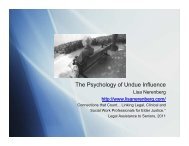Undue Influence: Definitions and Applications - California Courts ...
Undue Influence: Definitions and Applications - California Courts ...
Undue Influence: Definitions and Applications - California Courts ...
Create successful ePaper yourself
Turn your PDF publications into a flip-book with our unique Google optimized e-Paper software.
of anxiety, avoidance behavior <strong>and</strong> emotional numbing, disrupted interpersonal relationships,<br />
body image distortion <strong>and</strong>/or somatic <strong>and</strong>/or physical complaints, <strong>and</strong> sexual intimacy issues.<br />
Although battered women’s syndrome is not a legal defense in itself, courts in the U.S.<br />
<strong>and</strong> other countries have accepted evidence of it to explain the conduct of women in battering<br />
relationships who fight back <strong>and</strong> kill their abusers. Specifically, it may constitute self-defense,<br />
provocation, <strong>and</strong> diminished responsibility. The “battered woman’s defense” argues that a<br />
battered woman is a normal, reasonable person caught in irrational circumstances, responding as<br />
any reasonable person would. For a lawyer h<strong>and</strong>ling a woman's self defense case, it provides the<br />
tools to argue that what happened to the woman would happen to anybody under similar<br />
circumstances <strong>and</strong> that reasonable persons would use force in self-defense.<br />
This use of the battered women’s defense syndrome has been controversial. Legal <strong>and</strong><br />
feminist scholars have criticized it on the grounds that it focuses on women’s passivity <strong>and</strong> its<br />
portrayal of a singular profile (Jones, 1994). In addition, as men’s groups <strong>and</strong> others have<br />
challenged the emphasis on gender in explaining domestic violence, the syndrome’s focus on<br />
women has also been challenged. In 1994, as part of the Violence Against Women Act, the<br />
United States Congress ordered an investigation into the role of battered woman syndrome<br />
expert testimony in the courts to determine its validity <strong>and</strong> usefulness. Investigators concluded<br />
that an extensive body of scientific <strong>and</strong> clinical knowledge strongly supports the validity <strong>and</strong><br />
relevance of battering as a factor in the reactions <strong>and</strong> behavior of victims of domestic violence<br />
(National Institute of Justice, 1996). It therefore affirmed the utility within the trial process, <strong>and</strong><br />
at various stages of the criminal justice process, of evidence concerning the effects of battering.<br />
However, it also concluded that the term “battered woman syndrome” is too narrow, has some<br />
negative implications, <strong>and</strong> is no longer useful or appropriate. The term has been replaced with<br />
“battering <strong>and</strong> its effects.”<br />
<strong>Influence</strong> of Caretakers on Their Charges<br />
A few studies have explored how caregivers exert power over those they care for. In<br />
studying dementia caregivers, Dunham & Cannon (2006) concluded that to be successful, family<br />
caregivers must establish relationships of power over those they care for <strong>and</strong> substitute their<br />
82




